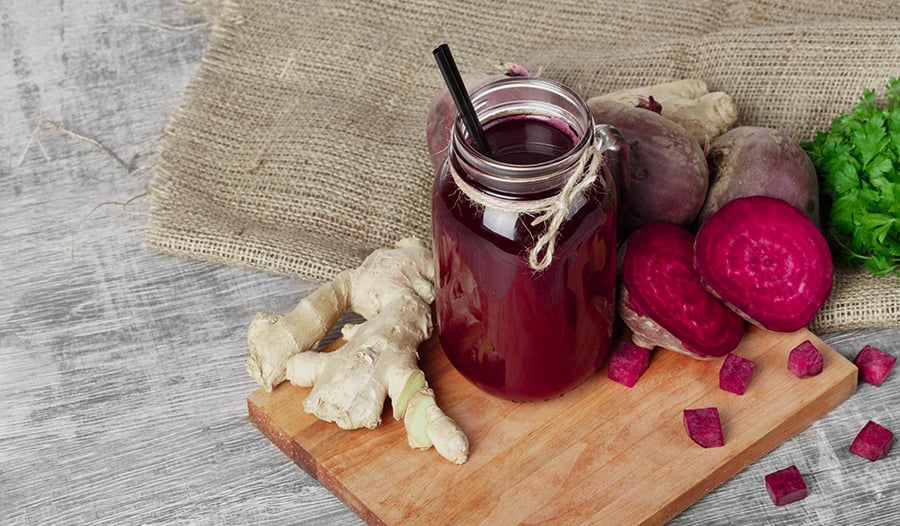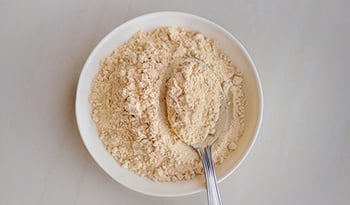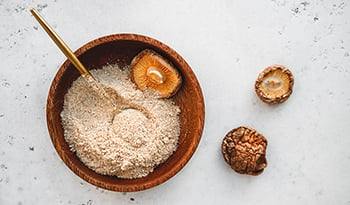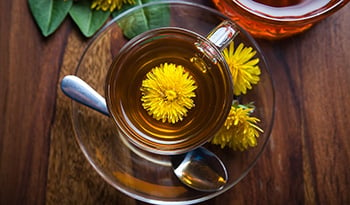5 Root Supplements with Impressive Health Benefits
DISCLAIMER:This blog does not intend to provide diagnosis...
- In this article:
- What Are Root Supplements?
- Berberine Health Benefits
- Ginger Health Benefits
- Maca Health Benefits
- Beetroot Health Benefits
- Astragalus Health Benefits

Root supplements have been increasing in popularity as more and more research starts to show the potential health benefits of these amazing plant products. From improving the immune system to increasing sensitivity to insulin, research suggests that root supplements may have impressive health benefits for the whole body.
What Are Root Supplements?
Root supplements are dietary products made from the roots of certain plants like ginger or licorice. These supplements are often potent in nature because roots are some of the most nutrient-dense parts of a plant.
This is because roots are the parts of the plant that absorb nutrients from the soil. They also store nutrients to bring to the rest of the plant as it grows and matures. When plant roots, like barberry, are cultivated and harvested at the right time, they have a nutrient-dense profile that can become a powerful root supplement.
Root supplements can come in many different forms. Preparations can include alcohol-based tinctures, powders, tablets, and capsules, among many others.
Research suggests that certain root-based supplements like berberine containing plants, ginger, maca, beetroot, and astragalus may have incredible health benefits.
Berberine Health Benefits
Berberine is a yellow, bitter-tasting alkaloid compound found in the roots and stems of many different plants like European barberry, goldenseal, Oregon grape, and coptis.
Research suggests that berberine may have a wide range of health benefits. One study, a meta-analysis consisting of 27 randomized controlled trials and over 2500 participants, found that berberine helped lower blood glucose levels and blood pressure. This same study found that berberine, in combination with other lipid-lowering medications, was more effective at lowering low-density lipoproteins (LDL)—bad cholesterol—than lipid-lowering drugs alone.
Research indicates that one reason berberine may help to lower blood glucose or blood sugar levels is that it increases the activity of insulin receptors on cells. This makes the body more sensitive to insulin and allows more glucose to be taken into the cells instead of staying in the bloodstream.
Studies also indicate that berberine may play a role in liver health. For example, animal studies show that berberine helps to reduce inflammation in liver cells by stopping the production of pro-inflammatory cytokines, which are cell messengers that create and encourage the inflammatory process in the body. Reducing inflammation in liver cells helps to reduce cell death and scarring of liver tissue.
Berberine may also help to improve nonalcoholic fatty liver disease. One study involving 184 patients found that the combination of berberine and lifestyle modification was superior to lifestyle modification alone in reducing the amount of fat in the liver of individuals with fatty liver disease. The participants even saw an improvement in body weight.
Ginger Health Benefits
Ginger is another root supplement that may have impressive health benefits for the body. Ginger is a popular root used both medicinally and as a flavoring for foods.
Used as a medicine for millennia, ginger has become a staple for pregnant women worldwide for its potential benefits on nausea and vomiting during pregnancy. Research indicates that ginger may be effective at reducing nausea and vomiting in other groups of individuals as well. For example, one study involving 70 children found that ginger was effective at reducing nausea and vomiting from acute gastroenteritis.
Studies also show that ginger may be effective at reducing nausea and vomiting caused by general anesthesia. This is because ginger may help to decrease gastric emptying time, the amount of time it takes for food to leave the stomach.
The potential health benefits of ginger may also include anti-inflammatory effects. Studies show that ginger helped to reduce inflammation in women who had metabolic syndrome. After ginger supplementation, the women had better insulin and blood glucose levels and lower C-reactive protein levels (a marker for inflammation).
Ginger may also help to reduce pain from osteoarthritis. One double-blind, placebo-controlled study followed 120 individuals aged 50-70 who suffered from osteoarthritis of the knee. After 3 months of ginger root supplementation, these individuals showed less inflammation, with a reduction of pro-inflammatory cytokine release in the body.
Maca Health Benefits
Maca is a root native to the Andes region in South America. This root has been farmed and harvested for thousands of years by the indigenous population of that region. While maca has been traditionally used as both a food and medicine for infertility, research suggests that this incredible root may have some other impressive health benefits.
For example, maca may help to increase energy. One study involving professional athletes showed that maca supplementation for 60 days improved their physical performance by more than 10%. This is because maca is thought to improve oxygen consumption by the body. Maca may also help to improve muscle strength while decreasing recovery time for strenuous activities. In animal studies, maca was shown to enhance leg grip strength of mice and improve exercise endurance. This was thought to be due to the potential for maca to clear out metabolites like lactic acid from the body faster while reducing oxidative stress.
Studies also suggest that maca may be beneficial for fertility and sexual well-being, confirming its traditional usage. One double-blind, randomized controlled trial on men with mild erect dysfunction showed that maca supplementation for 12 weeks helped improve general and sexual well-being. Another double-blind, randomized placebo-controlled study involving 69 men struggling with infertility showed an increase in sperm concentration after supplementation of maca for 12 weeks.
Beetroot Health Benefits
Beetroot is a humble earthy root vegetable with potential amazing health benefits. Studies suggest that beetroot may improve athletic performance. One meta-analysis involving 23 studies showed that supplementation with beetroot improved athletic performance by increasing time until exhaustion, improving efficiency, and enhancing maximum oxygen uptake.
Beetroot may also be a powerful antioxidant. Research indicates that beetroot may play a role in reducing oxidative stress by acting as an electron donor. This is due to the high amount of antioxidants contained in beetroot, like betalains, rutin, and caffeic acid.
In vitro, in-glass, or test tube studies also show that beetroot may provide protection against oxidative deoxyribonucleic acid (DNA) damage and preserve the structural integrity of proteins.
Beetroot may also play a role in supporting healthy blood pressure. One meta-analysis looked at the results of 22 studies on the effects of beetroot on systolic and diastolic blood pressure. Systolic blood pressure is the top number, and it measures the force that the heart puts on the walls of arteries when it is beating. Diastolic blood pressure is the bottom number and measures the force of the heart on arterial walls between beats.
Beetroot was shown to significantly decrease both systolic and diastolic blood pressure, especially when supplementation lasted longer than 14 days. This is thought to be due to the amount of inorganic nitrates in beetroot. The inorganic nitrates in beetroot are used to make nitric oxide in the body which helps promote the dilation and relaxing of blood vessels and smoother blood flow.
Astragalus Health Benefits
Astragalus is a plant widely used in traditional Chinese medicine (TCM) for millennia. In TCM, astragalus is used to strengthen the qi, or life force, of the body. It is also used as a digestive tonic and an immune aid. Research suggests that astragalus may have these properties as well as other impressive health benefits.
The effects of astragalus on immune health have been well studied. Astragalus may improve immune health by increasing T cell activation and interferon-alpha production. T cells can act as killer cells in the immune system or helper cells to help other immune cells, like B cells, create antibodies. Interferon-alpha is a cytokine produced by the immune system in response to foreign invaders in the body. Interferon-alpha helps to fight diseases like viral infections and has a major use in hepatitis C treatment.
Astragalus may also play a role in promoting anti-aging and longevity. One study found that astragalus may be able to protect against ultraviolet (UV) cell damage by preventing collagen degradation. UV-A radiation is associated with skin aging.
Studies suggest that astragalus may also help to increase telomerase activity in the body. Telomerase is an enzyme that helps maintain the length and integrity of telomeres, the structures at the end of chromosomes. Longer telomeres may be associated with a longer lifespan.
Root supplements are gaining popularity because of the potential health benefits these amazing plants have. Certain root supplements containing berberine, ginger, maca, beetroot, and astragalus may have an even wider range of impressive health benefits, ranging from blood pressure lowering to increasing life span. Increasing root supplement intake may provide a huge health advantage for life.
References:
- Adwan Shekhidem H, Sharvit L, Leman E, et al. Telomeres and longevity: a cause or an effect? Int J Mol Sci. 2019;20(13):3233. Published 2019 Jul 1. doi:10.3390/ijms20133233
- Alcalde AM, Rabasa J. Does Lepidium meyenii (maca) improve seminal quality? Andrologia. 2020;52(10):e13755. doi:10.1111/and.13755
- Bahadoran Z, Mirmiran P, Kabir A, Azizi F, Ghasemi A. The nitrate-independent blood pressure-lowering effect of beetroot juice: a systematic review and meta-analysis [published correction appears in Adv Nutr. 2018 May 1;9(3):274]. Adv Nutr. 2017;8(6):830-838. Published 2017 Nov 15. doi:10.3945/an.117.016717
- Clifford T, Howatson G, West DJ, Stevenson EJ. The potential benefits of red beetroot supplementation in health and disease. Nutrients. 2015;7(4):2801-2822. Published 2015 Apr 14. doi:10.3390/nu7042801
- Cong YS, Wright WE, Shay JW. Human telomerase and its regulation. Microbiol Mol Biol Rev. 2002;66(3):407-425. doi:10.1128/MMBR.66.3.407-425.2002
- da Silva Leitão Peres N, Cabrera Parra Bortoluzzi L, Medeiros Marques LL, et al. Medicinal effects of Peruvian maca (Lepidium meyenii): a review. Food Funct. 2020;11(1):83-92. doi:10.1039/c9fo02732g
- Domínguez R, Cuenca E, Maté-Muñoz JL, et al. Effects of beetroot juice supplementation on cardiorespiratory endurance in athletes. a systematic review. Nutrients. 2017;9(1):43. Published 2017 Jan 6. doi:10.3390/nu9010043
- Domínguez R, Maté-Muñoz JL, Cuenca E, et al. Effects of beetroot juice supplementation on intermittent high-intensity exercise efforts. J Int Soc Sports Nutr. 2018;15:2. Published 2018 Jan 5. doi:10.1186/s12970-017-0204-9
- Imenshahidi M, Hosseinzadeh H. Berberine and barberry (Berberis vulgaris): A clinical review. Phytother Res. 2019;33(3):504-523. doi:10.1002/ptr.6252
- Lan J, Zhao Y, Dong F, et al. Meta-analysis of the effect and safety of berberine in the treatment of type 2 diabetes mellitus, hyperlipemia and hypertension. J Ethnopharmacol. 2015;161:69-81. doi:10.1016/j.jep.2014.09.049
- Liang Y, Xu X, Yin M, et al. Effects of berberine on blood glucose in patients with type 2 diabetes mellitus: a systematic literature review and a meta-analysis. Endocr J. 2019;66(1):51-63. doi:10.1507/endocrj.EJ18-0109
- Liu P, Zhao H, Luo Y. Anti-aging implications of Astragalus membranaceus (Huangqi): a well-known chinese tonic. Aging Dis. 2017;8(6):868-886. Published 2017 Dec 1. doi:10.14336/AD.2017.0816
- LiverTox: clinical and research information on drug-induced liver injury [Internet]. Bethesda (MD): National Institute of Diabetes and Digestive and Kidney Diseases; 2012-. Alpha Interferon. [Updated 2018 May 4]. Available from: https://www.ncbi.nlm.nih.gov/books/NBK547867/
- Mozaffari-Khosravi H, Naderi Z, Dehghan A, Nadjarzadeh A, Huseini HF. Effect of ginger supplementation on proinflammatory cytokines in older patients with osteoarthritis: outcomes of a randomized controlled clinical trial. J Nutr Gerontol Geriatr. 2016;35:209–18.
- Nikkhah Bodagh M, Maleki I, Hekmatdoost A. Ginger in gastrointestinal disorders: a systematic review of clinical trials. Food Sci Nutr. 2018;7(1):96-108. Published 2018 Nov 5. doi:10.1002/fsn3.807
- Nocerino R, Cecere G, Micillo M, et al. Efficacy of ginger as antiemetic in children with acute gastroenteritis: a randomised controlled trial. Aliment Pharmacol Ther. 2021;54(1):24-31. doi:10.1111/apt.16404
- Poles J, Karhu E, McGill M, McDaniel HR, Lewis JE. The effects of twenty-four nutrients and phytonutrients on immune system function and inflammation: A narrative review. J Clin Transl Res. 2021;7(3):333-376. Published 2021 May 27.
- Qi Y, Gao F, Hou L, Wan C. Anti-inflammatory and immunostimulatory activities of astragalosides. Am J Chin Med. 2017;45(6):1157-1167. doi:10.1142/S0192415X1750063X
- Song D, Hao J, Fan D. Biological properties and clinical applications of berberine. Front Med. 2020;14(5):564-582. doi:10.1007/s11684-019-0724-6
- Tafuri S, Cocchia N, Vassetti A, et al. Lepidium meyenii (Maca) in male reproduction. Nat Prod Res. 2021;35(22):4550-4559. doi:10.1080/14786419.2019.1698572
- Yan HM, Xia MF, Wang Y, et al. Efficacy of berberine in patients with non-alcoholic fatty liver disease. PLoS One. 2015;10(8):e0134172. Published 2015 Aug 7. doi:10.1371/journal.pone.0134172
- Zhu H, Xu W, Wang N, et al. Anti-fatigue effect of Lepidium meyenii Walp. (Maca) on preventing mitochondria-mediated muscle damage and oxidative stress in vivo and vitro. Food Funct. 2021;12(7):3132-3141. doi:10.1039/d1fo00383f

 By Dr. Candace Mathers, N.D.
By Dr. Candace Mathers, N.D.


